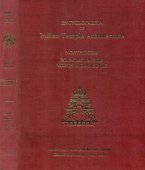Paramara, Paramāra: 6 definitions
Introduction:
Paramara means something in Hinduism, Sanskrit, the history of ancient India. If you want to know the exact meaning, history, etymology or English translation of this term then check out the descriptions on this page. Add your comment or reference to a book if you want to contribute to this summary article.
India history and geography
Source: Wisdom Library: India HistoryParamara refers to one of the thirty-six Rajput clans, according to Padmanabha’s 15th-century Kanhadadeprabandha, in which he described the Muslim invasion of Gujarat of 1298 AD. The kingdom or dynasty of the Paramaras had their own princes and nobles and were further separated into sub-clans and families. Their name can also be spelled as Paramāra.
The Rajputs are a Hindu race claiming to be descendants of the ancient Kṣatriya-varṇa (warrior caste). Originally, the Rajputs consisted of two principal branches: the Sūryavaṃśa (solar race) and the Candravaṃśa (lunar race), to which later was added the Agnivaṃśa (fire-born race).
Source: Shodhganga: Temple management in the Āgamas (history)Paramāra is the name of an ancient dynasty from Mālvā where Shaivism thrived between the 10th and 12th centuries, according to Dr. Akhilesh K. Dubey (2005). He notes several grants to temples, Śaiva Brāhmaṇas and ascetics of śaiva mutts. The Cāhamānas (of Śākambharī, Jāvalīpura and Naḍḍūla), the Paramāras of Mālvā, Pālas and Senas of Bengal, the Gāhaḍavālas of Kanauj, the Candellas and the Kalacūrīs of Tripurī were all staunch Śaivites. There is also evidence of Śaiva Brāhmaṇas migrating from various places to propagate their wisdom and teachings.
Source: OpenEdition books: Vividhatīrthakalpaḥ (History)Paramāra (परमार) are the rulers of Mount Abu and their capital is Candravatī, as is mentioned in the Vividhatīrthakalpa by Jinaprabhasūri (13th century A.D.): an ancient text devoted to various Jaina holy places (tīrthas).—On the Paramāra of Mount Abu, cf. p. ex. Choudhary 1954 p. 186-197.

The history of India traces the identification of countries, villages, towns and other regions of India, as well as mythology, zoology, royal dynasties, rulers, tribes, local festivities and traditions and regional languages. Ancient India enjoyed religious freedom and encourages the path of Dharma, a concept common to Buddhism, Hinduism, and Jainism.
Languages of India and abroad
Sanskrit dictionary
Source: Cologne Digital Sanskrit Dictionaries: Monier-Williams Sanskrit-English DictionaryParamāra (परमार):—[=para-māra] [from para] m. Name of a son of the Ṛṣi Śaunaka and ancestor of Bhoja-deva, [Inscriptions; Catalogue(s)] (cf. -mṛtyu).
[Sanskrit to German]
Sanskrit, also spelled संस्कृतम् (saṃskṛtam), is an ancient language of India commonly seen as the grandmother of the Indo-European language family (even English!). Closely allied with Prakrit and Pali, Sanskrit is more exhaustive in both grammar and terms and has the most extensive collection of literature in the world, greatly surpassing its sister-languages Greek and Latin.
See also (Relevant definitions)
Starts with: Paramaradhya, Paramarahasya, Paramarahasyajapasamgraha, Paramarahasyasamhita, Paramarahasyavada, Paramarahasyopadeshasamgraha, Paramarahasyopanishad, Paramaraja, Paramarajadhiraja, Paramarasa.
Full-text (+13): Dambarasimha, Kankadeva, Udayavarman, Jaggadeva, Bikamapura, Paragana, Bhoja, Tatparyadipika, Pratijagaranaka, Arikesarin, Malava, Mahakumara, Gahadavala, Malkhed, Mangalapura, Pala, Javalipura, Badnawar, Sena, Kalacuri.
Relevant text
Search found 5 books and stories containing Paramara, Paramāra, Para-mara, Para-māra; (plurals include: Paramaras, Paramāras, maras, māras). You can also click to the full overview containing English textual excerpts. Below are direct links for the most relevant articles:
Impact of Vedic Culture on Society (by Kaushik Acharya)
Mingling of Cultures (T): The Paramāras < [Chapter 4]
Sanskrit Inscriptions (K): The Paramāras < [Chapter 3]
Chart: Movement of Vedic Brāhmaṇas < [Chapter 3]
Amarakoshodghatana of Kshirasvamin (study) (by A. Yamuna Devi)
Date of Kṣīrasvāmin < [Chapter 2 - Kṣīrasvāmin: Life and Works]
Shishupala-vadha (Study) (by Shila Chakraborty)
Date of the poet Māgha < [Introduction]
Matangalila and Hastyayurveda (study) (by Chandrima Das)
Metaphors related to Elephants < [Chapter 4]
Metaphors regarding Elephants < [Chapter 2]
Rajaraja Chalukya < [April 1951]
Related products
